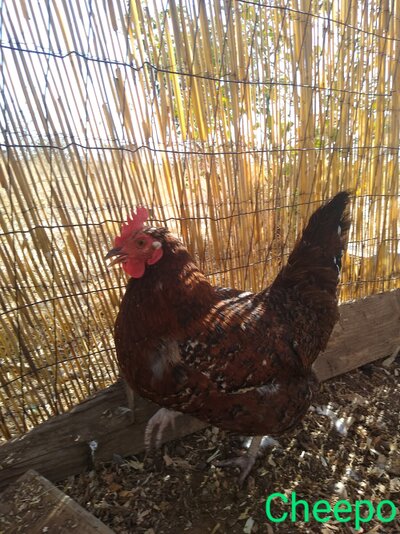The WinterWolf
Crowing
This is the first time I've done this. I didn't include ounces because they are squirmy. This thingy includes their weight, age, and breed.
Sprinkles:
Age: 2 years
Weight: 3 pounds
Breed: White Cochin bantam
Tuna:
Age: 1 year
Weight: 4 pounds
Breed: Partridge Cochin
Ash:
Age: 1 year
Weight: 4 pounds
Breed: Rhode island red
Juniper:
Age: 1 year
Weight: about 5 pounds
Breed: barred rock
Stilts:
Age: 1 year
Weight: 4 pounds
Breed: Delaware
Kilo hen:
Age: 2 years
Weight: 4 pounds
Breed: Mystic onyx
Doctor pooper:
Age: 1 year
Weight: about 4 pounds
Breed: barred rock
Cheepo:
Age: 1 year
Weight: 3.5 pounds
Breed: speckled Sussex
Taco:
Age: 1 year
Weight: 4 pounds
Breed: Welsummer
Oof, that's it! Sorry for almost completely wasting your time
Sprinkles:
Age: 2 years
Weight: 3 pounds
Breed: White Cochin bantam
Tuna:
Age: 1 year
Weight: 4 pounds
Breed: Partridge Cochin
Ash:
Age: 1 year
Weight: 4 pounds
Breed: Rhode island red
Juniper:
Age: 1 year
Weight: about 5 pounds
Breed: barred rock
Stilts:
Age: 1 year
Weight: 4 pounds
Breed: Delaware
Kilo hen:
Age: 2 years
Weight: 4 pounds
Breed: Mystic onyx
Doctor pooper:
Age: 1 year
Weight: about 4 pounds
Breed: barred rock
Cheepo:
Age: 1 year
Weight: 3.5 pounds
Breed: speckled Sussex
Taco:
Age: 1 year
Weight: 4 pounds
Breed: Welsummer
Oof, that's it! Sorry for almost completely wasting your time




